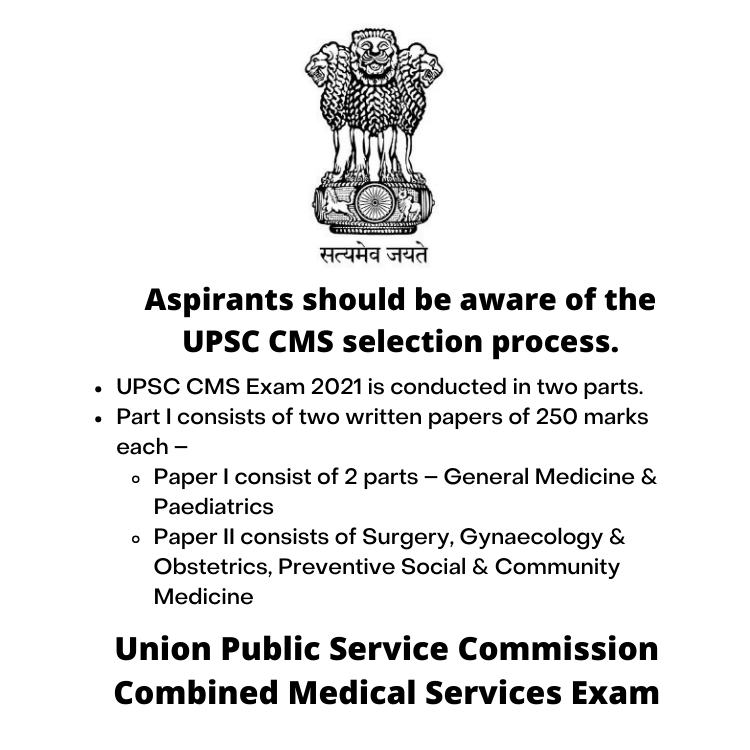The Union Public Service Commission (UPSC) conducts the Combined Medical Services Examination (CMSE) to shortlist the candidates for medical officer posts like Assistant Divisional Medical Officer in the Railways, Assistant Medical Officer in Indian Ordnance Factories Health Services & Other. The UPSC CMS Syllabus PDF 2021 will be released along with the official notification of the combined medical services examination. As per the official announcement, the UPSC CMS 2021 notification will be released on May 5, 2021.
UPSC CMS exam pattern:
The UPSC CMS exam comprises two stages, part I and part II, and the aspirants need to qualify for each of the stages.
Aspirants should be aware of the UPSC CMS selection process.
- UPSC CMS Exam 2021 is conducted in two parts.
- Part I consists of two written papers of 250 marks each –
- Paper I consist of 2 parts – General Medicine & Paediatrics
- Paper II consists of Surgery, Gynaecology & Obstetrics, Preventive Social & Community Medicine
- Part II consists of – Personality Test/Interview. It carries 100 marks.
UPSC CMS SYLLABUS 2021
PART I- Computer Based Test
| Stage 1/Part 1 – Computer Based Test | ||||
| PAPER | SECTIONS | NO. OF QUES | DURATION | MARKS |
| Paper 1 | 1. General medicine | 96 | 2 hours | 250 |
| 2. Paediatrics | 24 | |||
| Paper 2 | 1. General surgery | 40 | 2 hours | 250 |
| 2. Gynaecology and obstetrics | 40 | |||
| 3. Preventive social and community service | 40 | |||
- It is a Computer Based Test which consists of two papers – Paper 1 and Paper 2.
- Each paper carries 250 marks.
- Total mark of the CBT is 500.
- The questions in both papers of the CBT are objective type. Four options are given before every question. A student is required to choose the correct answer.
- There is a scheme of negative marking in the CBT papers. For every incorrect answer, 1/3 marks will be deducted.
- Each paper will be of 2 hours duration.
Syllabus of General Medicine – PAPER 1
The syllabus of General Medicine consists of the following topics:
- Cardiology
- Respiratory diseases
- Gastro-intestinal
- Genito-Urinary
- Neurology
- Haematology
- Endocrinology
- Metabolic disorders
- Infections/Communicable Diseases:
Virus, Rickets, Bacteria, Spirochaetal, Protozoan, Metazoan, Fungus
- Nutrition/Growth
- Diseases of the skin (Dermatology)
- Musculoskeletal System
- Psychiatry
- General
- Emergency Medicine
- Common Poisoning
- Snakebite
- Tropical Medicine
- Critical Care Medicine
- Emphasis on medical procedures
- Patho physiological basis of diseases
- Vaccines preventable diseases and Non-vaccines preventable diseases
- Vitamin deficiency diseases
- In psychiatry consists – Depression, psychosis, anxiety, bipolar diseases, and Schizophrenia.
Check out>> UPSC IAS syllabus
Syllabus of Paediatrics- PAPER 1
The syllabus of Paediatrics consists of the following topics:
- Common childhood emergencies
- Basic new-born care
- Normal developmental milestones
- Accidents and poisonings in children
- Birth defects and counselling including autism
- Immunization in children
- Recognizing children with special needs and management
- National programs related to child health`
Syllabus of Surgery – PAPER 2
The surgery syllabus includes the following topics:
- Wounds
- Infections
- Tumours
- Lymphatic
- Blood vessels
- Cysts/sinuses
- Head and neck
- Breast
- Alimentary tract:
Oesophagus, Stomach, Intestines, Anus, Developmental
- Liver, Bile, Pancreas
- Spleen
- Peritoneum
- Abdominal wall
- Abdominal injuries
- Urological Surgery
- Neuro Surgery
- Otorhinolaryngology E.N.T.
- Thoracic surgery
- Orthopaedic surgery
- Ophthalmology
- Anaesthesiology
- Traumatology
- Diagnosis and management of common surgical ailments
- Pre-operative and post-operative care of surgical patients
- Medicolegal and ethical issues of surgery
- Wound healing
- Fluid and electrolyte management in surgery
- Shock pathos-physiology and management.
Syllabus of Obstetrics- PAPER 2
The Obstetrics syllabus includes the following topics:
- Ante-natal conditions
- Intra-natal conditions
- Post-natal conditions
- Management of normal labors or complicated labor
Check out>> UPSC Mains General Studies Paper 1 Syllabus Pdf
Syllabus of Gynaecology- PAPER 2
The Gynaecology syllabus includes the following topics:
- applied anatomy
- applied physiology of menstruation and fertilization
- infections in the genital tract
- neoplasm in the genital tract
- the displacement of the uterus
- Normal delivery and safe delivery practices
- High-risk pregnancy and management
- Abortions
- Intra-Uterine growth retardation
- Medicolegal examination in obgy and Gynae including Rape.
Syllabus of Family Planning- PAPER 2
The Family Planning syllabus includes the following topics:
- Conventional contraceptives
- U.D. and oral pills
- The operative procedure, sterilization, and organization of programs in the urban and rural surroundings
- Medical Termination of Pregnancy
Syllabus of Preventive Social and Community Medicine- PAPER 2
The syllabus of Preventive Social and Community Medicine includes the following topics:
- Social and Community Medicine
- Concept of Health, Disease and Preventive Medicine
- Health Administration and Planning
- General Epidemiology
- Demography and Health Statistics
- Communicable Diseases
- Environmental Health
- Nutrition and Health
- Non-communicable diseases
- Occupational Health
- Genetics and Health
- International Health
- Medical Sociology and Health Education
- Maternal and Child Health
- National Programmes
- Management of common health problems
- Ability to monitor national health programs
- Knowledge of maternal and child wellness
- Ability to recognize, investigate, report, plan and manage community health problems including malnutrition and emergencies
UPSC CMS Part II: Interview Round
Candidates who qualify the Part I of the CMS selection process will be called for the Personality Test. The Interview round carries a total of 100 marks.
It will test the following qualities in the shortlisted candidates:
- Academic knowledge
- Balance of judgment
- General knowledge
- Initiative & leadership qualities
- Integrity of character
- Intellectual curiosity
- Ability for social cohesion
